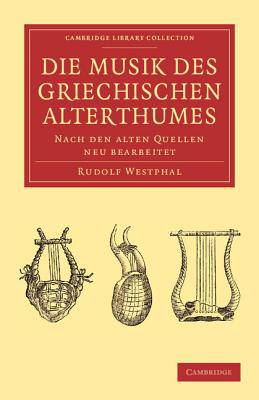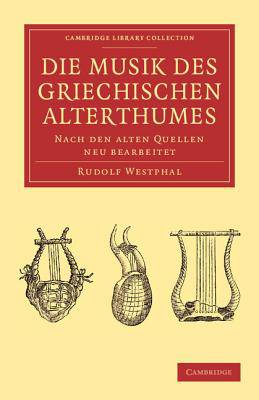
- Afhalen na 1 uur in een winkel met voorraad
- Gratis thuislevering in België vanaf € 30
- Ruim aanbod met 7 miljoen producten
- Afhalen na 1 uur in een winkel met voorraad
- Gratis thuislevering in België vanaf € 30
- Ruim aanbod met 7 miljoen producten
Zoeken
€ 75,95
+ 151 punten
Omschrijving
The German classical philologist Rudolf Westphal (1826─92) had originally studied theology at the University of Marburg before turning his attention to comparative linguistics. He learnt Sanskrit and Arabic and took a keen interest in Indo-European languages and Semitic grammar. In the late 1850s and early 1860s he joined his friend and fellow philologist August Rossbach (1823-98) at the University of Breslau (Wroclaw) and later taught at Moscow's Imperial Lyceum. In this 1883 work, he gives an extensive account of melody and rhythm in ancient Greek music. Westphal is full of admiration for the philosopher Aristoxenus (born c.370 BCE), whom he hails as 'the founder of musicology'. Following Aristoxenus' distinction between melody (quality of tone) and rhythm (quantity of tone), Westphal divides his work into two parts that describe and exemplify these components in detail. His multi-volume Theorie der musischen Künste der Hellenen is also reissued in this series.
Specificaties
Betrokkenen
- Auteur(s):
- Uitgeverij:
Inhoud
- Aantal bladzijden:
- 366
- Taal:
- Duits
- Reeks:
Eigenschappen
- Productcode (EAN):
- 9781108061476
- Verschijningsdatum:
- 22/08/2013
- Uitvoering:
- Paperback
- Formaat:
- Trade paperback (VS)
- Afmetingen:
- 140 mm x 216 mm
- Gewicht:
- 462 g

Alleen bij Standaard Boekhandel
+ 151 punten op je klantenkaart van Standaard Boekhandel
Beoordelingen
We publiceren alleen reviews die voldoen aan de voorwaarden voor reviews. Bekijk onze voorwaarden voor reviews.








